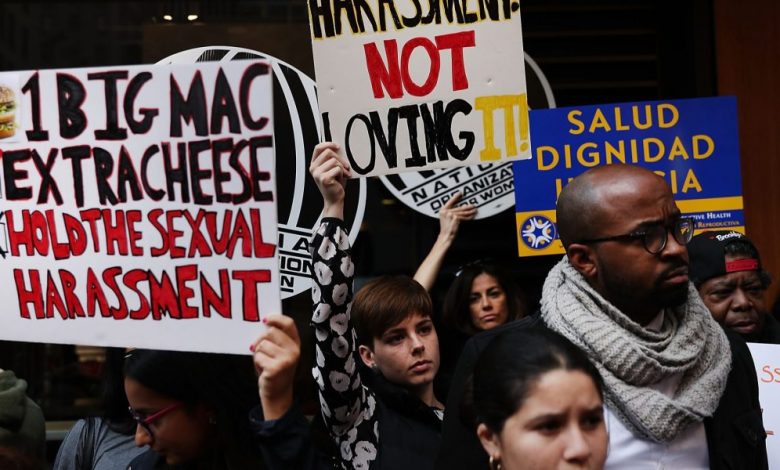McDonald’s manager ‘pulled his pants down’: Grocery giant promises to protect staff amid sexual harassment complaints

Working at McDonald’s was “one of the worst experiences of my life,” Christine recalls as she looks back on seven years at the fast-food giant, which ended with how she says she was sexually harassed by a manager.
Having just moved to London, she started working at McDonald’s in 2011 thinking “it would be really great”. Now she says, “I had no idea what I was getting myself into.”
She described to the BBC the toxic work culture at a south London branch, where she claims managers have been flirting with junior staff, “touching everyone’s butt” and saying “inappropriate things”.
The release of the allegations puts focus back on the fast-food chain as it faces an apparent spate of sexual harassment allegations – and lingering repercussions from the 2019 ouster of its former CEO over inappropriate workplace relationships.
The incident in the camp
Things got worse for Christine when she was sexually harassed by a manager at the camp in 2018.
Uncomfortable, Christine went to the storeroom to ask a manager for permission to go home, but was instead met with “really inappropriate sexual suggestions”.
“He pulled his pants down in the storage room and wanted me to do inappropriate things,” she said, adding that she was “not happy” with the progress and that the experience had “scared” her.
Christine said she left and lodged a complaint with her manager.
But she was told to “go back in the kitchen and work with him” after the manager spoke to the man in question. When she objected, she was told to call the police. “So I thought, good. I packed up my things and went home,” she said.
Christine never worked at McDonald’s again, although she claims the manager in question is still employed there.
According to Union, McDonald’s has swept complaints under the rug
McDonald’s said the experiences Christine described were “completely unacceptable and have no place in our restaurants.”
McDonald’s added in a statement wealth: “We work hard to create a positive work environment and culture. The safety of our teams and customers is our top priority. We have an open door policy and encourage all employees to speak up if they have any concerns – we have a People Services helpdesk and an employee support phone line, both of which can be contacted anonymously.”
The total number of sexual harassment complaints from McDonald’s employees in the UK is unclear.
But four years ago union officials at the Bakers, Food and Allied Workers Union (BFAWU) said they had received at least 1,000 from women who claimed they had been abused by co-workers.
In 2019, BFAWU officials said the company “swept under the rug” complaints of sexual harassment. They added that workers had been “victimized” for lodging complaints and that some had been paid compensation on condition that they sign non-disclosure agreements.
Concerns about the inadequate procedures used to deal with the allegations were raised by workers through the union, which prompted the Equality and Human Rights Commission (EHRC) to take action.
As a result, McDonald’s signed a legal agreement with the EHRC to protect employees from sexual harassment. The EHRC told the BBC it “did not make any frivolous agreements”.
As part of the agreement, announced today (February 8), the fast-food giant has committed to a range of measures, including anti-harassment training for employees and the introduction of training for managers to “identify areas of risk” and “Take action to prevent sexual harassment”.
Now the Equality Watchdog is monitoring McDonald’s to make sure it’s complying with the law. In the meantime, it is taking action to require US companies – which have also had allegations of sexual harassment by workers over the years – to sign a similar agreement.
Toxic behavior at the top
Revelations of a toxic culture at McDonald’s come after the company’s last chief executive officer was fired for violating its industrial relations policies.
Just last month, former McDonald’s CEO Steve Easterbrook was fined $400,000 by the SEC for “concealing the extent of his wrongdoing” over sexual relations with younger employees.
McDonald’s fired the British-born boss in 2019 for violating its industrial relations policy after discovering he had a consensual relationship with an employee.
At the time, the board ruled that he was fired without cause, which entitled him to over $40 million in compensation, benefits and stock under a “severance agreement.”
The company claimed he denied having any other “physical or non-physical” affairs with McDonald’s employees. But further investigation after a lead uncovered hidden relationships with other employees, including emails and messages with nude photos and videos confirming affairs with at least two other employees.
The chain accused Easterbrook of trying to cover his tracks by deleting the intimate images from his inbox, but they still existed on the company’s email servers.
As a result, McDonald’s decided to sue him to recover the full settlement he received.
The SEC announced in January that it “charged” the former McDonald’s CEO and president with “making false and misleading statements to investors about the circumstances leading up to his termination.”
The regulator said Easterbrook and McDonald’s were not honest with investors about the reason that led to Easterbrook’s termination, and this “allowed it to retain a significant equity return that would otherwise have been forfeited.”
Easterbrook has agreed to pay the $400,000 fine without admitting or denying the claims.
Before his default, Easterbrook, who grew up in Watford, Hertfordshire, was dubbed the “Wizard from Watford” for doubling the value of McDonald’s shares during his tenure.
He led the company from March 2015 to November 2019, having previously managed UK operations. During this time, he was also celebrated for reinvigorating the chain’s menus, transforming stores, and using better ingredients.
Learn how to navigate and build trust in your organization with The Trust Factor, a weekly newsletter exploring what leaders need to succeed. Login here.



